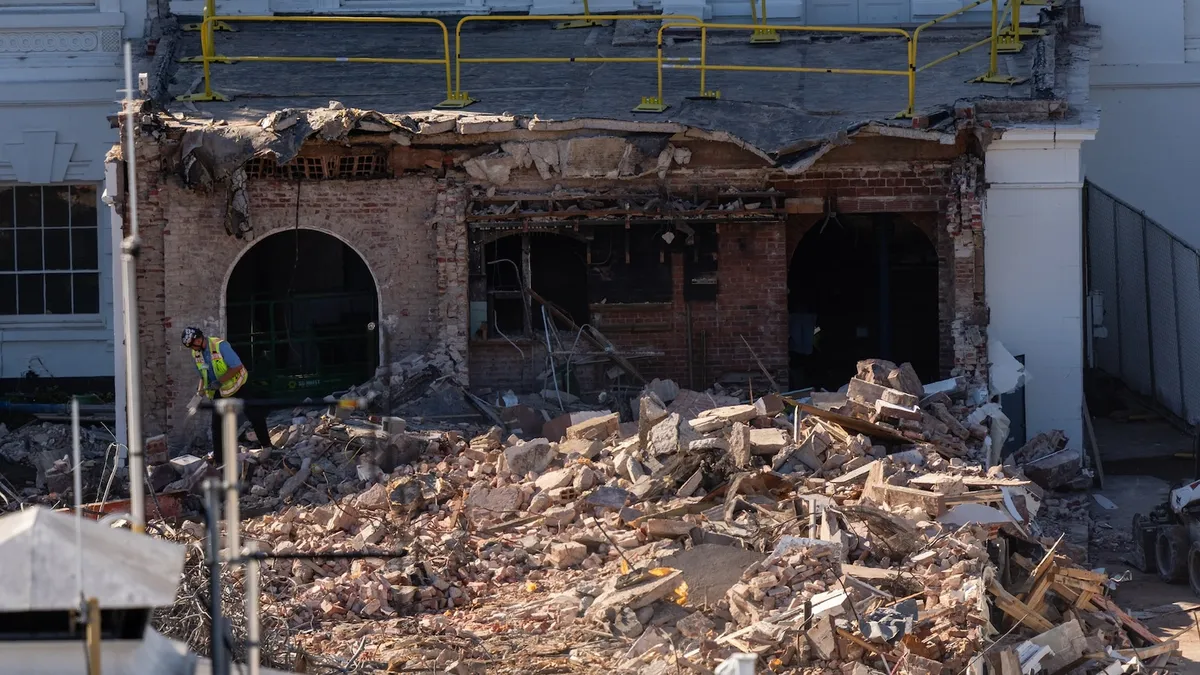
In the wake of the unexpected demolition of the East Wing of the White House, numerous critics have raised serious questions about whether the Trump administration and the contractors involved adhered to federal health and safety regulations. These concerns particularly focus on the handling of hazardous materials, such as asbestos, which was commonly used during the East Wing's original construction period.
On Thursday, Senator Edward Markey from Massachusetts sent a letter to executives at ACECO, the Maryland-based demolition contractor responsible for the project. In his correspondence, Markey requested evidence that the company complied with regulations for the safe removal of asbestos and lead. He emphasized that the demolition of a historically significant structure like the East Wing necessitates the highest standards of care, rather than prioritizing the lowest bid and neglecting regulations.
Markey's outreach follows alarm raised by the Asbestos Disease Awareness Organization (ADAO), the nation's largest asbestos victims' organization. They highlighted potential deviations from accepted practices for handling hazardous materials, noting that federal law mandates comprehensive inspections, notifications, and abatement before any demolition takes place.
A White House official declined to confirm whether asbestos was present in the East Wing, but stated that a “very extensive abatement and remediation assessment” was conducted, compliant with federal standards. They claimed that any hazardous material abatement occurred in September, prior to the demolition earlier this month. However, Linda Reinstein, president of ADAO, expressed skepticism, stating she has seen no public evidence confirming that proper assessments or abatement procedures were followed.
According to federal standards, rigorous inspections must be conducted before demolition, and these are documented with certification. If asbestos is identified, workers must be seen wearing protective gear, such as hazmat suits. Reinstein raised concerns for the safety of White House staff and other individuals near the demolition site, questioning what measures were implemented to safely handle asbestos and other hazardous materials.
Asbestos is a naturally occurring mineral that was commonly used in mid-20th-century construction due to its fireproofing and insulation properties. However, the health risks associated with asbestos exposure are now well-documented. Invisible fibers can become airborne during demolition, renovation, or maintenance, posing serious health risks. Doctors warn that there is no safe level of exposure, as even brief, unprotected work can lead to lung damage and increase the risk of developing mesothelioma, a type of cancer affecting the lung lining.
Dr. Raja Flores, an expert in lung health and the Chairman of Thoracic Surgery at Mount Sinai School of Medicine, emphasized that symptoms from asbestos exposure can take years to manifest. He described the progression of diseases related to asbestos exposure as “a prolonged and agonizing torture,” advising against any unprotected work in the demolition area.
Despite the administration's insistence that the demolition would not interfere with existing structures, recent polling reveals that a majority of Americans oppose the demolition of the East Wing. According to an ABC News/Washington Post/Ipsos poll, 56% of respondents are against the Trump administration's decision to tear down the East Wing, especially as part of plans to construct a 90,000-square-foot ballroom financed by $300 million in private donations.
Last week, Treasury Secretary Scott Bessent defended the demolition, suggesting that concerns about mold and asbestos justified the decision. However, the rapid pace of the demolition has raised eyebrows among environmental and health experts, who warn that moving debris potentially containing asbestos without appropriate safety measures could endanger public health.
Senator Markey's inquiry to ACECO seeks detailed information about the demolition timeline, processes followed, permits obtained, and any reported incidents. He has requested a response by November 12. As the situation develops, experts continue to express concern about the potential long-term health risks posed by the demolition debris and the safety of nearby populations.
With ongoing scrutiny of the East Wing demolition, the intersection of historical preservation, public health, and safety standards remains a critical issue that demands transparency and accountability from both governmental and contracting entities involved.